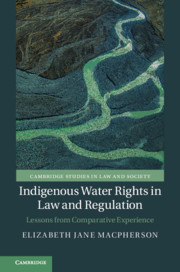Book contents
- Indigenous Water Rights in Law and Regulation
- Cambridge Studies in Law and Society
- Indigenous Water Rights in Law and Regulation
- Copyright page
- Dedication
- Contents
- Acknowledgements
- Chapter One Introduction
- Part I Conceptualising Indigenous Water Rights
- Chapter Two Justifying Indigenous Water Rights:
- Chapter Three Regulating Indigenous Water Rights:
- Part II Comparative Country Studies
- Part III Lessons Learnt
- Glossary
- Bibliography
- Index
- Cambridge Studies in Law and Society
Chapter Two - Justifying Indigenous Water Rights:
Jurisdiction and Distribution
from Part I - Conceptualising Indigenous Water Rights
Published online by Cambridge University Press: 20 July 2019
- Indigenous Water Rights in Law and Regulation
- Cambridge Studies in Law and Society
- Indigenous Water Rights in Law and Regulation
- Copyright page
- Dedication
- Contents
- Acknowledgements
- Chapter One Introduction
- Part I Conceptualising Indigenous Water Rights
- Chapter Two Justifying Indigenous Water Rights:
- Chapter Three Regulating Indigenous Water Rights:
- Part II Comparative Country Studies
- Part III Lessons Learnt
- Glossary
- Bibliography
- Index
- Cambridge Studies in Law and Society
Summary
Chapter 2 explores the tensions in debates about indigenous water rights in legal and political theory, setting up the key propositions for this book.I argue that legal and policy mechanisms that seek to recognise cultural relationships with water and involve indigenous peoples in water governance should strive towards recognising indigenous water relationships but, more importantly, indigenous water jurisdiction. This argument is central to the consideration of the four country studies included in this book, in which law and policy is sometimes able to provide a space for indigenous groups to exercise jurisdiction in planning and governing their water resources. I also contend that the reason states should provide for indigenous water rights is an imperative of distribution. Such rights are needed not only to remedy the historical injustice of non-recognition but because indigenous exclusion from water law frameworks is ongoing.
- Type
- Chapter
- Information
- Indigenous Water Rights in Law and RegulationLessons from Comparative Experience, pp. 17 - 31Publisher: Cambridge University PressPrint publication year: 2019



